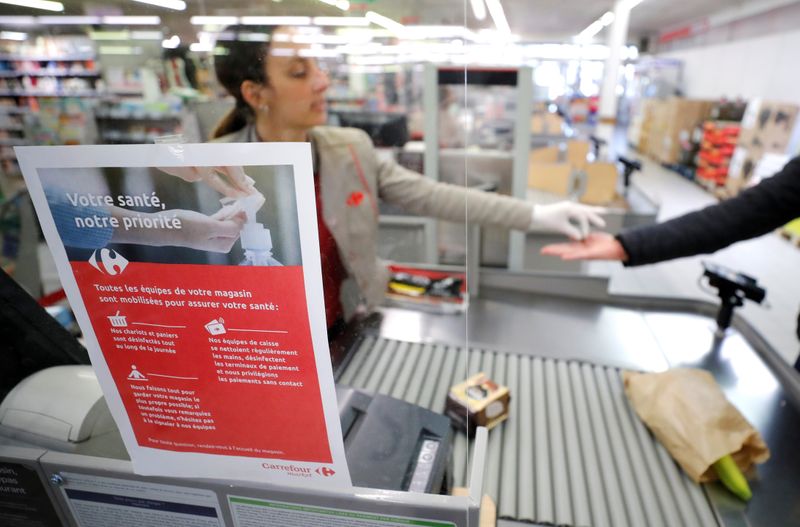By Caroline Pailliez and Sarah White
PARIS (Reuters) - When 52-year-old supermarket cashier Aicha Issadounene died after contracting the coronavirus, her Carrefour (PA:CARR) colleagues felt the full fear of working on the frontline.
"I'm scared to go to work," said Tshela Ngandu, 53, who worked as a Carrefour cashier in the Paris suburb of Seine-Saint-Denis alongside union representative Issadounene.
Issadounene's last day at work was on March 16, when she sat at a counter welcoming shoppers, union officials said. She began coughing and stopped working the next day, a colleague who did not want to be named told Reuters.
There has been no evidence that Issadounene caught coronavirus at the store, where she worked part-time for decades to supplement her income as an accountant with a nearby firm, though her story has resonated with colleagues.
When Issadounene fell ill, French authorities had yet to impose restrictive measures to curb the spread of the coronavirus and staff had not been issued with masks.
Ten days later, the checkout worker was dead.
From the piazzas of Italy and plazas of Spain to the malls of the United States, supermarkets are playing a vital role in feeding people during the coronavirus pandemic, with measures now being taken to protect their staff.
At the Carrefour store in Seine-Saint-Denis this week, staff were wearing masks and only 100 customers were allowed inside at a time. Perspex shields were fitted at the checkouts.
Ngandu and other staff at the store who spoke to Reuters said they believed the protections were adequate.
Carrefour said employee safety was its top priority and that it had pre-empted government instructions and rolled out protective equipment early on.
WALK OUT
While supermarket workers everywhere face similar fears, in France they have the right in law to walk off the job, on full pay, if they don't feel safe. And managers are finding it hard to keep their shelves filled and tills staffed.
Absenteeism has reached 10-15% across the French supermarket sector, trade unions say, and in some stores has hit 40%.
Workers are off because they need to look after children with schools closed, because they are sick themselves, or in some cases because they have stayed at home out of fear.
But at a hypermarket run by Carrefour, Europe's biggest retailer, near the city of Marseille, some 200 workers out of 515 walked out on Monday, citing a lack of protective gear.
They only resumed work after store managers distributed a newly-acquired batch of face masks.
Carrefour said absences were on average 10% higher than usual, but largely due to staff having to take leave to look after children.
Some French supermarkets are calling in temporary workers or students to help, as well as office-based staff.
Casino-owned Monoprix sent a request to firms in sectors that have had to shut down to put forward any workers that might want to help in their stores, a letter seen by Reuters shows.
Monoprix did not respond to a request for comment.
Supermarkets are also trying to persuade existing staff to work through the coronavirus crisis. Along with rivals such as Leclerc and Auchan, Carrefour has offered staff an extra 1,000 euros tax free.
A MASK A DAY
After the government lifted a requisition order on masks made in France for medical workers, Carrefour said it had managed to get hold of its first supplies of 2 million on Sunday though a private order, and would receive some 20 million more.
But employees and unions said that protective equipment was not always reaching stores on time or in enough quantities.
"We have one mask a day, that's far from being total protection for us," said Laetitia Gerbot, a 40-year-old mother of three who works at a Carrefour hypermarket in Bray-sur-Seine, 100 km (60 miles) south-east of Paris.
A small number of cashiers at her store had walked out on Tuesday because they had not received masks, Gerbot said, adding they arrived later the same day and staff returned to work.
While she had never been on strike, Gerbot said she would walk out if managers did not protect staff and colleagues were infected.
News of the sudden death of Issadounene, who was buried on Wednesday, has spread fast among her co-workers.

"We learn that the lady, Aicha, died not long ago, and we realise that no one is safe. That makes us think," Gerbot said.